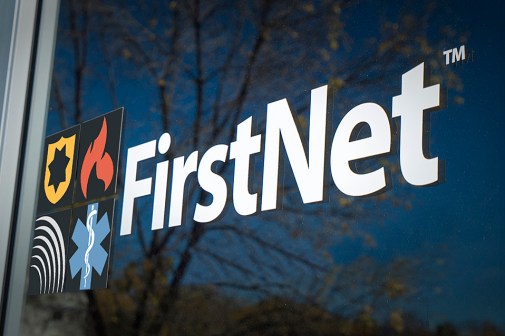States cite network coverage concerns as FirstNet comments period closes

The 45-day window for states to provide FirstNet feedback on its plans for a nationwide communications network for public safety closed Friday. And while 12 states and territories have now opted in to the plans put forth by the federal agency, questions remain for the 44 still mulling the decision, particularly with regard to network coverage.
Montana is the latest state to join the list of those who will offer AT&T’s next-generation data service to first responders. It joins Maine, Wyoming, Michigan, New Mexico, Iowa, Arkansas, Kentucky, West Virginia, Virginia, New Jersey, and the U.S. Virgin Islands.
FirstNet has now begun what it calls an “adjudication” period in which it will evaluate the comments submitted by states and determine “what we can answer, what we can’t answer,” Richard Reed, FirstNet’s chief customer officer, told StateScoop. Even if the agency cannot respond to a state comment or question, Reed said it is “committed” to providing explanations and context on why it can’t respond.
Reed declined to comment on how many states formally filed comments during the initial 45-day review period, but how the agency addresses common concerns of coverage and cost could influence the decisions of the remaining states, according to several sources interviewed by StateScoop.
And that decision deadline is coming soon. FirstNet and AT&T will provide governors official notice that their final state plans are ready “no later than mid-September.” From that point, states will have 90 days to decide whether they will opt in to the AT&T offering or instead hire another vendor to create a comparable solution that can be hooked into the national system. The opt-in/opt-out decision made by each state will determine the communications technology available to police, firefighters, paramedics and other first responders who frequently find themselves in situations in which a few seconds can save lives.
Opting in, but looking for more
While the choice of opting out is presented by FirstNet detractors as one that could potentially afford a state improved performance, features, pricing and political autonomy, the level of financial risk and some technical details that would be associated with such arrangements remain unclear.
Virginia, the first state to opt in to FirstNet, explained why and how it came to that decision before a Senate subcommittee hearing last month. Virginia’s deputy secretary of homeland security and public safety, Curtis Brown, testified before the Subcommittee on Communications, Technology, Innovation, and the Internet that the state was surprised upon first viewing its state plan that most of the information contained therein, “besides the state coverage map and local data,” had already been made available.
Less overall risk and a desire to provide new services to first responders as quickly as possible were the main factors that drove the state’s opt-in decision, Brown told Congress, adding that the decision will “undoubtedly stimulate economic competition among all wireless carriers” and “influence further improvements to the network.”
“Opting in does not commit the Commonwealth to any role in the FirstNet buildout,” Brown explained. “FirstNet and AT&T will build, operate, and maintain the Commonwealth’s portion of the National Public Safety Broadband Network at no cost to Virginia. … Opting out would have required accepting the unknown associated costs and risks for the ongoing deployment, operation, maintenance, and improvement of the network [in Virginia].”
While opting out of the AT&T plan was thought to be “not realistic,” Brown said, he noted that the state’s decision still came with several shortcomings, which include AT&T’s coverage gaps in small and rural markets and the current lack of “mission critical voice” functionality.
While FirstNet’s RFP contains a March 2019 milestone to include mission critical voice — the moniker assigned to a particular reliable and dedicated form of radio voice communication — “more information is needed on specific, intermediate milestones for technology development, testing and validation, along with committed resources and actions to achieve those milestones,” Brown said.
In response, FirstNet said the agency will continue to work alongside the state to update officials on timelines and communicate the status of the network’s buildout.
“We’re going to continue to work with the state of Virginia as well as all of the states to help them better understand where we are in terms of core infrastructure development,” Reed said.
Coverage and service costs were likewise among the top considerations for Arkansas, another opt-in state, Penny Rubow, statewide interoperability coordinator for the state of Arkansas, told StateScoop.
“The most difficult part was making sure that all the reviewers had adequate time to work through the assigned sections [of the plan],” Rubow said in an email. “We achieved this by having small group meetings to facilitate the review process.”
Already, first responders in Arkansas have access to new “limited functionality” and AT&T will “soon” meet with public safety customers to migrate service to FirstNet, she said.
‘Coverage is always king’
While states like Virginia and Arkansas made their decisions quickly, some states were delayed in gaining access to state plans and were forced to rush in order to meet the deadline to return comments to FirstNet.
Washington was “really scrambling” to gather responses after issues arose with the terms of use agreement the state was required to sign to gain access to its plan. The state was delayed access until June 28, said Shelley Westall, Washington state’s single point of contact (SPOC). And then there were issues with issuing credentials for users to access the plan through the state’s private online portal, and so their review time was nearly cut in half, she said.
“We had more users wanting to review the plan than FirstNet was comfortable because of the proprietary information in the plan,” Westall said.
After FirstNet approved the state’s user list, Washington convened five workshops around the state to gather feedback from first responders, Westall said. While not everyone was permitted direct access to the portal hosting details of the state’s plan, most of the 175 responses the state received came via a secondary online system that they set up, she said, which meant their process for navigating the federal agency’s portal access rules were working.
Reed told StateScoop that while Washington did not receive an extension on its comment period, he expects dialogue between states and the network authority to remain open beyond the initial comment period.
“We’re trying to stick very tightly to our timeline and still keep the adjudication period and then ultimately the official plan period aligned with the dates we’ve put forth,” Reed said. “… We don’t turn information or data away if people want to continue to engage with us in consultation, share questions, share comments. We’re taking all of those questions to heart.”
As to the factors that will influence Washington state’s decision going forward, it was a similar refrain.
“Coverage is always king. Coverage and price,” Westall said. “There was a lot of discussion about the accuracy of the coverage map that we were provided. [AT&T] seemed to be rather optimistic about where services were at today and what level of service. So that’s still our biggest focus area.”
Concerns in Washington state were echoed by Mark Goldstein, director of physical infrastructure issues for the U.S. Government Accountability Office, who also testified on FirstNet before Congress last month. Goldstein noted the financial uncertainty surrounding the public safety network that is funded in part by $6.5 billion awarded to AT&T by FirstNet.
While states are required to participate in their pieces of the network buildout in some fashion, public safety users will not be required to use the network and so “substantial unknowns remain,” Goldstein said, regarding “the extent to which AT&T will be successful in monetizing the spectrum to retain revenue from commercial users, and the extent to which this revenue will be sufficient or appropriate in relation to the capital needed to build, operate, and maintain the network.”
Goldstein also noted that while the majority of state officials his office spoke with reported satisfaction with FirstNet’s engagement efforts, tribal stakeholders expressed concern with the agency’s heavy reliance on single points of contact rather than working directly with the tribes. One of the five tribes the GAO contacted had not been made aware of the project at all, Goldstein testified.
Years of work ahead
Communication has been critical to the evaluation process in California, where SPOC Patrick Mallon said the state “owed it to public safety” to share as much information as it could. Mallon reported that the state held 12 outreach meetings across the state attended by nearly 800 people and that they gathered more than 700 comments. More than half, Mallon said, were related to concerns about network coverage.
“The major concern was coverage,” Mallon said. “AT&T has really stressed their capacity, but capacity does not equal coverage. There’s a lot of areas in California where AT&T does not have good coverage. Agencies that provide services in those areas expressed the concern that if FirstNet is not going to provide any coverage then there’s no reason for us to subscribe.”
Reed responded that the FirstNet network would boast “very strong” operational coverage as soon as governors make the decision to opt-in and that the network will continue to expand its coverage and capacity over the course of AT&T’s 25-year contract.
“I think states recognize that,” Reed said. “We’re going to continue to address those coverage needs in perpetuity. … Just to stay competitive, we’re going to have to grow this network and stay current and competitive from a coverage standpoint. We still have to provide a network that people can afford to adopt, and we have to be cost-conscious. We’re doing our best to balance those two things.”
Mallon also noted the concerns surrounding the lack of clarity around how much subscriptions will cost departments and some technical concerns related to the ability of agencies to meet federal compliance standards when connecting to secure sites.
“Making the right decision is paramount,” Mallon said. “The need for interoperability among public safety and first response agencies has been something that’s been lacking for many, many years and this is a great opportunity for us and we certainly look forward to participating in a system, whether it’s through the FirstNet offering or through a state-sponsored radio access network.”
StateScoop’s Jake Williams contributed reporting and writing to this story.





